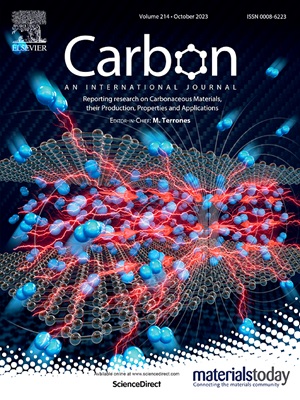Interface optimization by introducing Ti for strengthening graphene network/copper composites: New insight from MD simulations
IF 10.5
2区 材料科学
Q1 CHEMISTRY, PHYSICAL
引用次数: 0
Abstract
The inadequate bonding at the interface between graphene and the Cu matrix has significantly impeded the advancement of graphene-reinforced Cu matrix composites. In this study, Ti was introduced between the three-dimensional graphene network (GN) and the Cu matrix, which effectively strengthened the interfacial bonding by in-situ formation of CuxTiy compounds and TiC with both the Cu matrix and GN. Compared with the GN/Cu composites, the maximum strength and interface separation strain of the GN-TiC-CuxTiy/Cu (GT/Cu) composites are enhanced by 40 % and 275 %, respectively. Molecular dynamics simulations were used to study the strengthening mechanism of the GT/Cu composites. The results show that, the formation of Ti–C bonds, mechanical interlocking, and strong chemisorption significantly enhanced the interfacial adhesion and stress transfer between GN and the matrix, delaying the nucleation and propagation of cracks. On the other hand, the metallic bonds formed between the CuxTiy layer and the Cu matrix further promote the stress transfer between the matrix and the reinforcement, and alleviate the stress concentration in the reinforcement part. In addition, the strengthened interface with dislocation blocking effectively enhances the load-bearing capacity of the Cu matrix. This study provides a new approach for the development of high-strength Cu matrix composites.

通过引入Ti来增强石墨烯网络/铜复合材料的界面优化:来自MD模拟的新见解
石墨烯与Cu基之间的界面键合不足严重阻碍了石墨烯增强Cu基复合材料的发展。在本研究中,在三维石墨烯网络(GN)和Cu基体之间引入Ti,通过与Cu基体和GN原位形成CuxTiy化合物和TiC,有效加强了界面结合。与GN/Cu复合材料相比,GN- tic - cuxtiy /Cu (GT/Cu)复合材料的最大强度和界面分离应变分别提高了40%和275%。采用分子动力学模拟方法研究了GT/Cu复合材料的强化机理。结果表明:Ti-C键的形成、机械联锁和强化学吸附显著增强了GN与基体之间的界面粘附和应力传递,延缓了裂纹的形核和扩展;另一方面,CuxTiy层与Cu基体之间形成的金属键进一步促进了基体与增强体之间的应力传递,缓解了增强体部分的应力集中。此外,位错阻挡界面的强化有效地提高了Cu基体的承载能力。本研究为开发高强度铜基复合材料提供了新的途径。
本文章由计算机程序翻译,如有差异,请以英文原文为准。
求助全文
约1分钟内获得全文
求助全文
来源期刊

Carbon
工程技术-材料科学:综合
CiteScore
20.80
自引率
7.30%
发文量
0
审稿时长
23 days
期刊介绍:
The journal Carbon is an international multidisciplinary forum for communicating scientific advances in the field of carbon materials. It reports new findings related to the formation, structure, properties, behaviors, and technological applications of carbons. Carbons are a broad class of ordered or disordered solid phases composed primarily of elemental carbon, including but not limited to carbon black, carbon fibers and filaments, carbon nanotubes, diamond and diamond-like carbon, fullerenes, glassy carbon, graphite, graphene, graphene-oxide, porous carbons, pyrolytic carbon, and other sp2 and non-sp2 hybridized carbon systems. Carbon is the companion title to the open access journal Carbon Trends. Relevant application areas for carbon materials include biology and medicine, catalysis, electronic, optoelectronic, spintronic, high-frequency, and photonic devices, energy storage and conversion systems, environmental applications and water treatment, smart materials and systems, and structural and thermal applications.
 求助内容:
求助内容: 应助结果提醒方式:
应助结果提醒方式:


